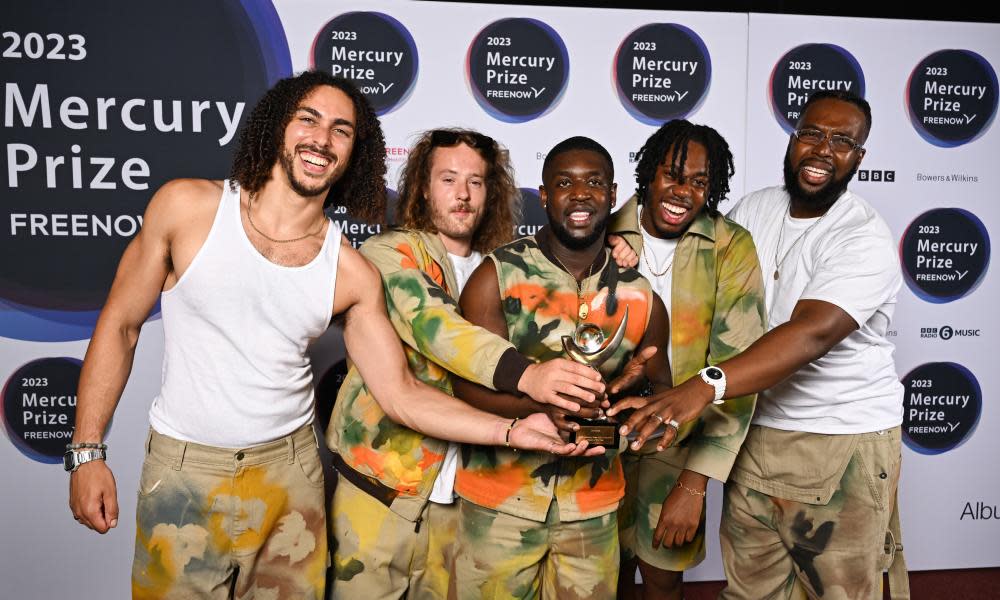Take the vitality of diverse Britain, set it to music. That’s why Ezra Collective deserve their Mercury prize

Of the various baubles handed out to creative types each year, the Mercury prize is known for being one of the most political. The narrative matters. What’s big? Who do we reward? How does the prize itself stay relevant? And the Mercury prize 2023 for the best British or Irish album goes to Ezra Collective, the first time a jazz artist has won it. But however the judges got there, or why, this year they kind of got it right.
Two scenes. One is at Ronnie Scott’s jazz club in London. Ezra Collective are launching their new album, Where I’m Meant to Be. There are three shows that night – an early, an evening and a late – and Ezra are doing them all. They are all different. They are all packed. The sea of bald heads (including my own) and grey hairs customarily seen at Ronnie’s is displaced by healthy fine heads of hair and an energy that swirls like a vortex.
Bandleader Femi Koleoso wanders on to the stage, talks conspiratorially to the crowd about the joy of being at Ronnie’s, the band’s journey to get there and the part that the crowd, the devotees, have played in their success so far. And then they start to play in the half-light – and it’s as if someone out of sight has pressed a small nuclear device. Before long the booths and the seats are a hindrance and the tables rendered superfluous as the venerable jazz establishment becomes a sweaty, airless, boisterous nightclub.
There is an air of something close to religiosity, which swoops, rises and then glides gently to earth. As I leave, the band members are being surrounded and Koleoso is in the street outside, chatting with the sweaty departees and introducing them to his mum.
And then the band are at the North Sea Jazz Festival in Rotterdam this summer. Others have been there before them. Everyone who matters: Miles Davis, Herbie Hancock, Ella Fitzgerald, Dizzy Gillespie, Duke Ellington, George Benson. It’s eclectic, so add BB King, and this year add Stormzy. He is on the main stage – he’s massive everywhere. Ezra are on a smaller stage, but still it’s cavernous. It’s perhaps five times bigger than Ronnie Scott’s – but again, the place is packed, the place is young and when, without any drama, they start to play, again there is a sort of uncontrolled explosion.
There is something flammable in what they do. It’s a mix of jazz, funk, reggae, rap and Afrobeat, and the mix is the point. It makes what they do so recognisable to those who like it. To me, it’s very British. The references come from all over but they are collected and fused together in the same way British society, at its best, as well as some sectors of British industry, draws multiple cultural strands together, integrating them, making them powerful, making them exportable and saleable. Our best fashion designers do just that. It’s when we take the energy and diversity that comes from that cultural synthesis and harness it into something we recognise and enjoy; and others embrace because it feels fresh and original.
Related: Ezra Collective’s Mercury win finally acknowledges a golden age for UK jazz | Alexis Petridis
Soul ll Soul, another band in another era, did much the same in 1989 with Keep on Movin’. It was a mega hit that talked about endurance through hardship, which spoke to our young black lives. It sounded like soul and R&B, genres we adored from the US, but at the same time it sounded like a booming reggae record playing through the enormous speakers of a rough and ready Jamaican dancehall sound system. It caused an earthquake here, but then – with a mix no one had heard before – did the same in the US, where it was No 11 on the US Billboard chart, No 1 on the Billboard R&B chart. We loved it because it was us. It sold because it was us. Today’s equivalent just won the Mercury prize.
“We met in a youth club,” Koleoso said, accepting the award. “This moment we’re celebrating right here is testimony to good, special people putting time and effort into [helping] young people to play music … let’s continue to support that.” The band seem to see beyond the music and its commercialisation. Towards the end of one track, there is a short spoken dialogue in which Koleoso discusses meeting a fan and realising the power of what they do. “She was crying and eventually she said, ‘I have had the worst week ever, but for one hour I was able to forget all about’, and she was saying thank you. At that moment music changed for me, because I realised this isn’t just notes being put together, this is something with some power to change people in a serious way.”
That was his statement of intent. It doesn’t always, but today the Mercury prize spoke eloquently too.
Hugh Muir is executive editor, Opinion

 Yahoo News
Yahoo News 
